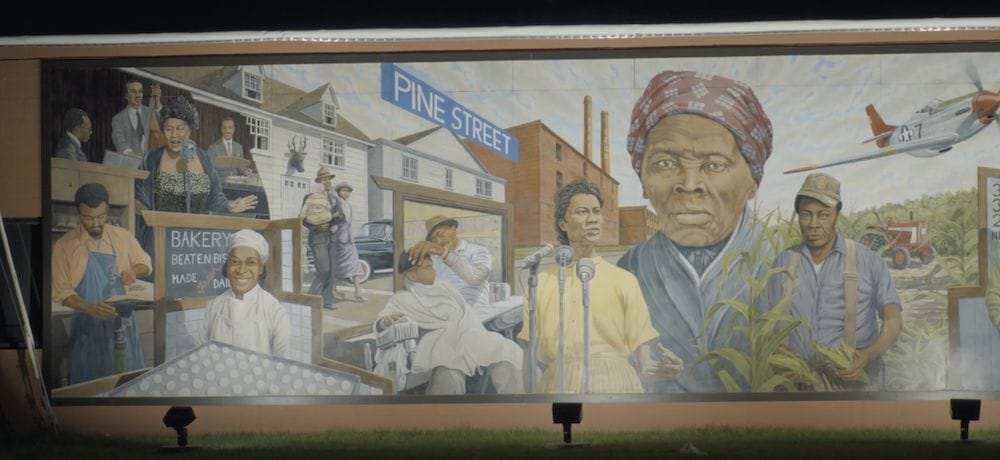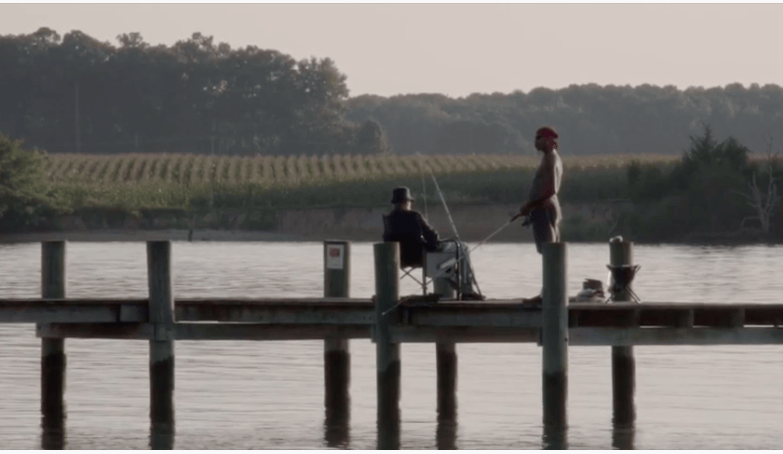Read more reviews from the 2020 Chesapeake Film Festival here
We’re deep into this story when a White man —with bright blue eyes that seemingly pop from his slight, perhaps ‘80s-something frame —avers that he hopes what people will associate with his hometown of Cambridge, Maryland is that it’s a nice place to live, and a place where the people are friendly. Out of context, this might sound like something most might say of their beloved hometown anywhere.
But by this point in the story, you too might find these words quite a mind jostle. Granted the film’s opening aerial shots of graceful sailboats in the Chesapeake Bay Harbor are downright idyllic. It is also true that we’ve heard many references—from both the local-born and newcomers alike—that the town has good bones; meaning the aesthetically pleasing architecture we see gracing the downtown area.
Though congenial these surroundings might be, they certainly had zip to do with why the town’s most famous resident came back to visit again and again. A mural shows her with hand outstretched—a welcoming gesture for sure—and one that today’s tourists seem to like to mirror in selfie poses. This most famous Cambridge native is none other than Harriet Tubman, holding her outstretched hand out to Cambridge’s slaves, many her kin, to bravely follow her on the Underground Railroad to freedom. Quite a mind jolt, too, to hear a Black woman who grew up in the town recount how she had never learned about Tubman in school. We later also hear her pain at learning that her port town then became a center of slave breeding—where fathers, brothers, or uncles might have been forced to have sex with her female forbears.
Brace yourself for such slow-burn, mind jolts to layer on top of another as this tale unfolds. Piecing the story together—and this is a film that doesn’t unfold linearly—we learn that it's probable that this Black woman went to school with White kids with the same last name, the progeny of the slave-owners who owned her ancestors. At Christmas time, they may have all sat on Santa’s lap in the well kempt town center in what looks like a bandstand, not realizing long ago it was the slave auction block in this port town.
More though, we imagine that the White townspeople never had a clue that Cambridge was once dubbed Little New York. Count Basie, Ella Fitzgerald, Duke Ellington, Little Richard, James Brown—to name but a few of the music royals who graced this hot spot on the Chitlin Circuit’s stages and clubs. This was one happening place—and with a thriving Black business center that fed off the same big company that the White people worked at. Briefly, this company gave Cambridge enough prosperity to go all around.
All that crumbled when the big company left, baring the deep and festering racial scars below the good time patina—that even today makes for the likes of drive-by bigots shouting “White Power” to a gaggle of Black ministers taking in the new Tubman-centered mural.
White readers old enough to know who Son-of-Sam is, like this reviewer, may find themselves somewhat disoriented by wondering where the heck they were when the film’s namesake Groove City moniker was born. Straight Outta Compton, as it turns out, was actually an export direct from hip-hop’s early home in Cambridge, Maryland.
Chesapeake Film Festival Tells Both a Local Story and an American Story
Clueless about this history? You too may want to watch this film twice and ponder deeply why Cambridge can or cannot be the Ground Zero of healing the U.S. racial divide, as one Black townsperson suggests it should. Filmed before George Floyd’s murder, as so many others similarly being catapulted into White minds courtesy of cellphone cameras, YOU DON’T KNOW NOTHIN’ ABOUT GROOVE CITY connects the dots between slave ships to today’s headlines with great power, in this writer’s view. The minister/filmmaker’s comparison of how healing can only happen in the way that worst marriages are repaired—without bypassing the stage of sharing anger and resentment that permeate bad marriages—is a breathtaking insight that clings as the wisest words always do.
This is a top pick film for history buffs, music lovers, and anyone who cares deeply about racial and social justice.
Highly Recommended
Nominate this for The Picture This Post BEST OF 2020???
Click Readers' Choice
Vote Securely! Vote Privately! And Make Your Vote Count-- as all voting should be!!
For more information on this film and the FREE 2020 Virtual Chesapeake Film Festival -- Oct. 1 - October 4, 2020, visit
the Chesapeake Film Festival website.
Photos: Courtesy of the Chesapeake Film Festival
About the Author: Amy Munice
Amy Munice is Editor-in-Chief and Co-Publisher of Picture This Post. She covers books, dance, film, theater, music, museums and travel. Prior to founding Picture This Post, Amy was a freelance writer and global PR specialist for decades—writing and ghostwriting thousands of articles and promotional communications on a wide range of technical and not-so-technical topics.
Amy hopes the magazine’s click-a-picture-to-read-a-vivid-account format will nourish those ever hunting for under-discovered cultural treasures. She especially loves writing articles about travel finds, showcasing works by cultural warriors of a progressive bent, and shining a light on bold, creative strokes by fledgling artists in all genres.

